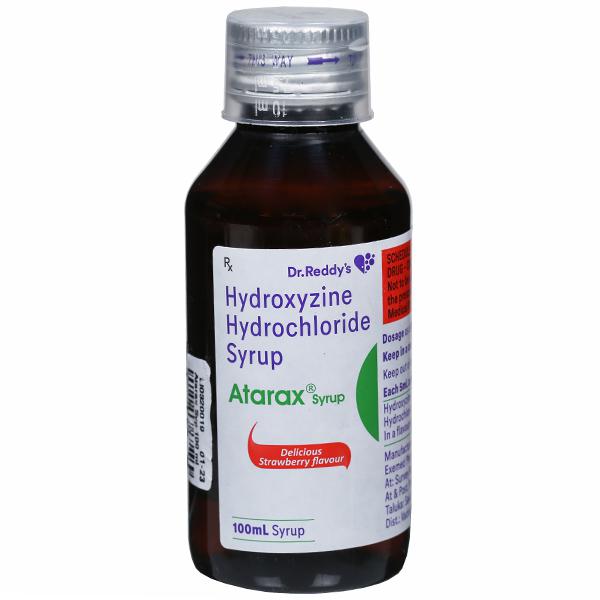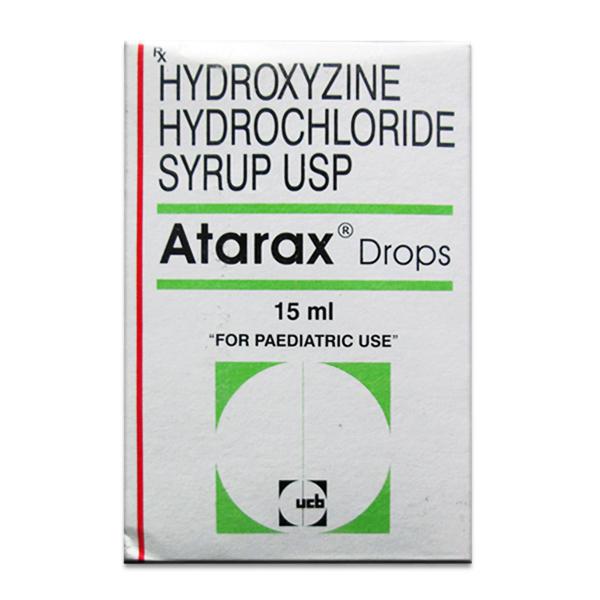Atarax Syrup HYDROXYZINE
Introduction to Atarax Syrup
Atarax Syrup is a medication primarily used to help manage anxiety and relieve itching caused by allergies. It contains the active ingredient Hydroxyzine, which works by calming the brain and reducing histamine, a natural substance in the body that causes allergic symptoms.
Composition of Atarax Syrup
Atarax Syrup contains Hydroxyzine as its active ingredient. It is formulated to be taken orally and is available in a liquid form for easy administration, especially for children or those who have difficulty swallowing pills.
Uses of Atarax Syrup
- Calming anxiety and nervousness related to mental health or physical illnesses.
- Relieving itchy skin caused by allergies.
- Helping to relax before or after surgery.
Side effects of Atarax Syrup
Common side effects:
- Sleepiness
- Dry mouth
Serious side effects:
- Skin rashes
- Heart rhythm issues
- Low blood pressure
- Uncontrolled movements
Precautions of Atarax Syrup
Atarax Syrup should not be taken by pregnant women early in their pregnancy, individuals allergic to Hydroxyzine or similar medications, or those with certain heart conditions. It is not known if it is safe for breastfeeding. Avoid taking it with alcohol or other drugs that cause drowsiness.
How to Take Atarax Syrup
- For adults with anxiety, the dose is 50 to 100mg up to four times a day.
- For children under 6, the total daily dose is 50mg, split into smaller doses.
- Older children over 6 take 50 to 100mg daily, also split up.
Conclusion of Atarax Syrup
Atarax Syrup is an effective medication for managing anxiety and allergic reactions. However, it is important to use it under medical supervision, considering the potential side effects and precautions. Always follow the prescribed dosage and consult your healthcare provider for any concerns.


Can Atarax syrup be taken safely while breastfeeding?
Atarax syrup is not recommended while breastfeeding. It may pass into breast milk and affect the nursing infant. There is limited information on its effects during lactation, so it's important to discuss with your doctor if you're breastfeeding. Your doctor can help determine the safest treatment options for you and your baby.

Can Atarax syrup be taken safely while pregnant?
Atarax syrup is not recommended during early pregnancy due to potential risks to the developing fetus. There is limited information on its safety during pregnancy, so it's important to discuss with your doctor if you're pregnant or planning to become pregnant. Your doctor can help determine the safest treatment options for you and your baby.

Can I take Atarax syrup with other prescription drugs?
Atarax syrup can interact with other medications that cause drowsiness, such as sedatives, sleeping pills, and certain pain medications. These interactions can increase drowsiness and dizziness. Always inform your doctor about all the medications you are taking to avoid potential interactions. Your doctor can help manage your medications safely and effectively.

Does Atarax syrup affect appetite?
Atarax syrup doesn't typically affect appetite. Most people taking this medication don't notice changes in how hungry they feel. If you notice any unexpected changes in your appetite after starting Atarax syrup, talk with your doctor. They can help determine if the medication is the cause or if there might be another reason for the changes.

Does Atarax syrup affect mood?
Atarax syrup doesn't typically cause mood changes. Most people take this medication without experiencing mood swings, anxiety, or agitation. If you notice changes in your mood after starting Atarax syrup, talk with your doctor. These symptoms might be related to something else, like stress or another health condition. Your doctor can help determine the cause and suggest appropriate support.

Does Atarax syrup affect sleep?
Atarax syrup doesn't typically cause sleep problems. Most people take this medication without experiencing changes in their sleep patterns. If you notice changes in how well you sleep after starting Atarax syrup, talk with your doctor. Sleep problems might be related to something else, like another medication or a different health condition. Your doctor can help figure out the cause and suggest ways to improve your rest.

Does Atarax syrup cause headaches?
Headaches are not a common side effect of Atarax syrup. Most people take this medication without experiencing headaches. If you do get mild headaches while taking Atarax syrup, staying well-hydrated and resting may help. You can also take over-the-counter pain relievers after checking with your doctor. For severe or persistent headaches, talk with your healthcare provider to determine if they are related to the medication.

Does Atarax syrup cause stomach upset?
Atarax syrup can occasionally cause stomach upset, including nausea or vomiting. These effects are usually mild. Taking the medication with food might help reduce discomfort. If you experience severe or persistent stomach issues, talk with your doctor. They can help determine if these symptoms are related to Atarax syrup or if there might be another cause.

Does Atarax syrup cause weight gain?
Atarax syrup does not typically affect body weight. Most people taking this medication do not experience significant weight changes. If you notice unexpected weight gain or loss while taking Atarax syrup, talk with your doctor. They can help determine if the medication is the cause or if there might be another reason for the changes.

Does Atarax syrup interfere with sexual function?
Atarax syrup may cause sexual side effects, but they are not common. Some people might experience changes in sexual desire or performance. These effects are usually mild. If you notice any changes in your sexual function while taking Atarax syrup, talk to your doctor. They can help determine if the medication is the cause and suggest ways to manage these effects. It's important to address any concerns with your healthcare provider to ensure your treatment is effective and comfortable.

Does Atarax syrup limit driving?
Atarax syrup can cause drowsiness and dizziness, which may impair your ability to drive safely. Avoid driving until you know how the medication affects you. If you feel drowsy or lightheaded, it's best to avoid driving or operating heavy machinery. Always prioritize safety and discuss any concerns with your doctor.

Does Atarax syrup make it hard to think or concentrate?
Atarax syrup can cause drowsiness, which might make it hard to think or concentrate. These effects are usually mild and temporary. If you notice problems with your thinking or concentration, talk with your doctor. They can help determine if Atarax syrup is the cause and suggest ways to manage these effects while continuing your treatment.

Does Atarax syrup make people tired or drowsy?
Yes, Atarax syrup can cause drowsiness and tiredness. These effects are common and usually mild. If you feel very sleepy or fatigued, talk with your doctor. They can help determine if Atarax syrup is the cause and suggest ways to manage these effects. Proper rest, regular physical activity, and a balanced diet can help maintain your energy levels.

For how long do I take Atarax syrup?
Atarax syrup is usually used for short-term relief of symptoms like anxiety or itching. The duration of use depends on your specific condition and response to treatment. Your doctor will guide you on how long to take Atarax syrup. Always follow your doctor's instructions and discuss any concerns about the duration of your treatment.

How does Atarax syrup work?
Atarax syrup works by blocking histamine, which is a chemical in the body that causes allergy symptoms. It also has a calming effect on the brain, which helps reduce anxiety. Think of it like turning down the volume on a loud radio. By blocking histamine and calming the brain, Atarax syrup helps relieve symptoms of anxiety, itching, and allergies.

How do I know if Atarax syrup is working?
Atarax syrup is used to treat anxiety, itching, and allergies. You'll know it's working if you notice a reduction in anxiety symptoms, less itching, or relief from allergy symptoms. Your doctor may monitor your progress through regular check-ups. If you don't notice improvement or have concerns about your treatment, discuss them with your healthcare provider.

How do I take Atarax syrup?
Take Atarax syrup as prescribed by your doctor. It can be taken with or without food. The usual dose is 25 mg to 100 mg per day, divided into smaller doses. Do not crush or chew the tablets. If you miss a dose, take it as soon as you remember, unless it's almost time for your next dose. In that case, skip the missed dose. Do not double up on doses. Avoid alcohol while taking Atarax syrup, as it can increase drowsiness.

How long does it take for Atarax syrup to start working?
Atarax syrup starts working within 30 minutes to an hour after taking it. The full therapeutic effect may take a few hours to be noticeable. Factors like your age, weight, and overall health can affect how quickly it works. Always take Atarax syrup as prescribed for the best results and discuss any concerns with your doctor.

How should I store Atarax syrup?
Store Atarax syrup at room temperature, away from moisture and light. Keep it in a tightly closed container. Do not store it in the bathroom, where humidity can affect the medication. Keep it out of reach of children and pets. Always check the expiration date and properly dispose of any unused or expired medication.

Is Atarax syrup effective?
Atarax syrup is effective for treating anxiety, itching, and allergies. It works by blocking histamine, which is a chemical in the body that causes allergy symptoms. It also has a calming effect on the brain, which helps reduce anxiety. Clinical studies support its effectiveness for these conditions. Always follow your doctor's instructions to ensure the best results from your treatment.

Is Atarax syrup safe for the elderly?
Elderly individuals are more sensitive to the effects of Atarax syrup, especially drowsiness and dizziness. These side effects can increase the risk of falls. It's important for elderly patients to use Atarax syrup under close medical supervision. Dose adjustments may be necessary to minimize risks. Always discuss any concerns with your doctor to ensure safe and effective use of the medication.

Is it safe to drink alcohol while taking Atarax syrup?
It's best to avoid alcohol while taking Atarax syrup. Alcohol can increase the sedative effects of Atarax syrup, leading to increased drowsiness and dizziness. This combination can impair your ability to perform tasks that require alertness, such as driving. If you choose to drink, do so in moderation and be aware of how your body responds. Discuss any concerns with your doctor.

Is it safe to drink coffee or tea while taking Atarax syrup?
You can drink coffee and tea while taking Atarax syrup, but be mindful of caffeine's stimulating effects. Atarax syrup can cause drowsiness, and caffeine might counteract this effect. However, there are no known interactions between Atarax syrup and caffeine. Enjoy caffeinated drinks in moderation and monitor how your body responds. If you have concerns, discuss them with your doctor.

Is it safe to exercise while taking Atarax syrup?
You can exercise while taking Atarax syrup, but be cautious. Atarax syrup can cause drowsiness and dizziness, which might affect your balance and coordination during physical activity. Start with light exercises and see how your body responds. If you feel dizzy or unusually tired, stop and rest. Always listen to your body and consult your doctor if you have concerns about exercising while on this medication.

What are Atarax syrup possible harms and risks?
Atarax syrup usually causes mild side effects like sleepiness and dry mouth that often go away quickly. Rarely, more serious problems can occur, such as skin rashes, heart rhythm issues, low blood pressure, or uncontrolled movements. If you take too much, you'll likely get very sleepy. Treatment for an overdose involves making you vomit, cleaning your stomach, and providing supportive care. Low blood pressure is treated with fluids and specific medications; avoid using epinephrine.

What disease or symptom is Atarax syrup used for?
Atarax syrup is used to treat anxiety, itching, and allergies. It helps reduce anxiety by calming the brain and relieves itching and allergy symptoms by blocking histamine. Atarax syrup can be used alone or as a complementary addition to other therapies. Always follow your doctor's instructions to ensure the best results from your treatment.

What is Atarax syrup?
Atarax syrup is an antihistamine medication used to treat anxiety, itching, and allergies. It works by blocking histamine, which is a chemical in the body that causes allergy symptoms. Atarax syrup also has a calming effect on the brain, which helps reduce anxiety. It is used alone or as a complementary addition to other therapies for these conditions.

What is the usual dose of Atarax syrup?
The usual starting dose of Atarax syrup for adults is 25 mg, taken three to four times a day. The dose may be adjusted based on your response and needs. The maximum recommended dose is 100 mg per day. For children and the elderly, the dose may be lower, and adjustments are made carefully. Always follow your doctor's specific dosing instructions for your health needs.

Who should avoid taking Atarax syrup?
Do not take Atarax syrup if you are allergic to it or its ingredients. It is contraindicated in early pregnancy due to potential risks to the fetus. People with certain heart conditions should use it cautiously, as it can affect heart rhythm. Always inform your doctor about your medical history and any other medications you are taking to avoid potential risks.

















.svg)
